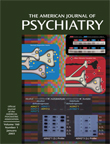Response of Cortical Metabolic Deficits to Serotonergic Challenge in Familial Mood Disorders
Abstract
OBJECTIVE: In subjects with mood disorders, positron emission tomography (PET) with [18F]fluorodeoxyglucose has shown prefrontal cortical metabolism deficits, including in a subgenual region in subjects with familial illness. The authors applied a dl-fenfluramine challenge method to study metabolic response in this region to serotonergic challenge in familial major depression. METHOD: The study group consisted of 19 depressed subjects with major depressive disorder or bipolar disorder, all of whom had at least one first-degree relative with history of major depression, and 10 healthy volunteers with similar age and gender distributions. PET images were acquired under placebo and challenge conditions, and volumetric MRI scans were also obtained. Group comparisons of metabolic and volumetric data were performed. Ratings of acute mood change during serotonergic challenge were compared with the imaging data. RESULTS: Within Brodmann’s area 32, a glucose metabolism deficit in the depressed subjects on placebo day was observed by voxel-level analysis, but no volumetric deficit was found in the subgenual regions examined. Under challenge, both groups suppressed metabolism similarly. Within the patient group, the correlation between acute mood improvement during challenge and greater metabolic suppression approached significance. CONCLUSIONS: In familial mood disorders, a ventromedial prefrontal cortical deficit in baseline metabolism is not due to altered structural volume, and the response to serotonergic challenge appears predictive of acute mood response. The potential to predict treatment response can be tested by a combined challenge and treatment study.



